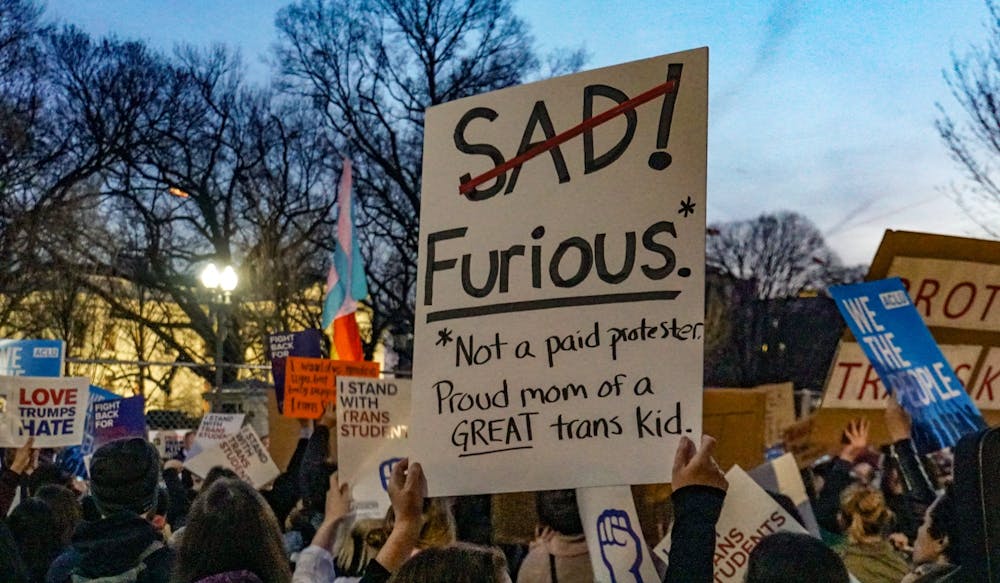In partnership with the Mountainfilm film festival and the Saul Zaentz Charitable Foundation, the Hopkins Film and Media Studies program hosted a screening of Changing the Game on Thursday, Oct. 24.
The documentary — which centers on a group of transgender high school athletes and the various tribulations that they face as they continue to participate in school sports after transitioning — was a sympathetic and nuanced exploration of the lives of its stars that managed to be revealing without becoming exploitative.
Changing the Game consists of three narratives, each one centering on a different student and the different perspectives that they offer about the intersection between athletics and gender identity.
In Texas, the documentary follows Mack Beggs — a wrestler forced to compete on the girls team despite transitioning — as he prepares to defend his title in the state championships. Meanwhile Andraya Yearwood is allowed to run on her school’s girls track team but faces backlash from those who think that she has an unfair advantage in races. Finally we are introduced to Sarah Rose Huckman, who splits her time between skiing and advocating for legislation that would prevent gender identity discrimination.
Although these three narratives never overlapped, the filmmakers did an excellent job of unifying them on a thematic level. From the start, it was abundantly clear how much the students’ participation in athletics means to them: The camera took great care to highlight the intense training that they all go through in order to remain in peak condition and the joy that they get whenever they compete.
At the same time there are explicit parallels between the various policies that the characters must contend with and the ways that their identity affects their ability to compete. As a result, the shifting narrative focus never felt jarring, and I was never disappointed or confused by the perspective changes.
Although the three plotlines don’t really have the same narrative momentum — Mack’s preparation for the state championships is the only real plotline — all three receive more or less the same focus during the calmer, slice-of-life moments that occur away from the athletics. That was where the film really shone.
These scenes did a fantastic job of showing the central characters outside of the conflicts that formed the crux of the documentary’s story. These are also some of the film’s most heartwarming moments, especially the scenes that centered on the (overwhelmingly positive) ways that the students’ parents and grandparents have responded to their transition and their willingness to support their loved ones in their transition.
That being said, the film also doesn’t shy away from portraying the transphobia and bigotry that the students encounter. Thankfully the filmmakers kept those encounters brief, but they condensed a lot of hatred into those clips. In one scene Mack silently scrolls through waves of vitriolic comments on Facebook, and the anguish on his face was devastating to watch.
Still, the film’s message is ultimately one of hope. Even though the students’ situation might not have been ideal, the documentary makes it clear that they are inspiring others and making the world a better place by tenaciously pursuing their passions. It might seem like a bit of a trite message, but it resonated because of how much the audience learns about these students’ lives, which makes it near-impossible not to root for them.
All in all, Changing the Game is an excellently crafted documentary. It’s an enjoyable and thought-provoking window into life as a transgender teen and balances the struggles of its characters with the anticipation of a better future. I would highly recommend it full stop.
The screening was followed by a Q&A session with Andraya Yearwood and her mother, where the two spoke about their experiences making the documentary, their thoughts on the final product and what their lives looked like after the film. The session offered a look both beyond the confines of the film and behind the creative decisions that went into making it.
Yearwood spoke about how it felt to have her experiences featured on the film.
“There were times when I felt uncomfortable about it... when I contemplated whether I wanted to go through with it. But I think at the end of the day, it’s not just about me, it is about the entire community. It’s about the global level,” she said.
Even without the additional context that the Yearwoods were able to provide at the screening, I would definitely encourage anyone who is interested to check out the documentary. It is sure to be an engaging experience.





